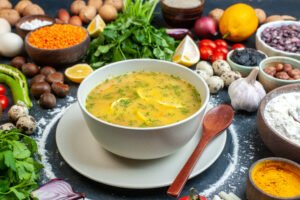
Can I drink cranberry juice with gastritis?
Cranberry juice is not just a refreshing beverage; it also offers numerous health benefits, including relief from gastritis symptoms.
In this guide, we’ll explore how to prepare cranberry juice at home, its healing properties for gastritis, the best ways to consume it, and when to incorporate it into your routine for maximum effectiveness.
Step-by-Step Preparation
Making cranberry juice at home is simple and allows you to customize the flavor and sweetness according to your preferences.
Here’s a step-by-step guide to preparing fresh cranberry juice:
Gather Ingredients:
- Fresh or frozen cranberries
- Water
- Sweetener (optional, such as honey or maple syrup)
Rinse the Cranberries:
- Place the cranberries in a colander and rinse them thoroughly under cold water to remove any dirt or debris.
Boil the Cranberries:
- In a saucepan, combine the rinsed cranberries with water in a ratio of approximately 1 cup of cranberries to 4 cups of water.
- Bring the mixture to a boil over medium heat, then reduce the heat and let it simmer for about 10-15 minutes, or until the cranberries have softened and burst open.
Strain the Mixture:
- Once the cranberries have cooked down, remove the saucepan from the heat and allow the mixture to cool slightly.
- Pour the mixture through a fine mesh strainer or cheesecloth into a clean container, pressing gently to extract as much juice as possible while leaving behind the pulp and skins.
Sweeten to Taste (Optional):
- If desired, sweeten the cranberry juice to taste with honey, maple syrup, or your preferred sweetener. Stir until the sweetener is fully dissolved.
Chill and Serve:
- Transfer the cranberry juice to a glass pitcher or bottle and refrigerate until thoroughly chilled.
- Serve the cranberry juice over ice, garnished with fresh cranberries or a slice of lemon, if desired.

Variations and Flavor Enhancements
Cranberry juice can be tailored to suit individual tastes and preferences through various flavor enhancements and creative combinations.
Consider the following suggestions to customize your cranberry juice experience:
- Fruit Additions
Experiment with adding other fruits to your cranberry juice blend to balance out the tartness and enhance the flavor profile.
Oranges, apples, pears, and raspberries complement the natural acidity of cranberries and contribute sweetness and depth of flavor.
- Herbal Infusions
Elevate the taste of your cranberry juice by infusing it with aromatic herbs and spices.
Fresh mint, ginger, cinnamon, and basil can impart refreshing or warming notes, depending on your preference. Simply muddle the herbs or steep them in the juice for added complexity.
- Citrus Zest
Enhance the citrusy brightness of cranberry juice by incorporating zest from lemons, limes, or oranges. Citrus zest adds a burst of flavor and aroma without the additional acidity of juice, making it an excellent garnish or infusion ingredient.
- Sweeteners
While cranberries are naturally tart, you can adjust the sweetness of your juice to suit your taste buds. Experiment with different sweeteners such as honey, maple syrup, agave nectar, or stevia to find the perfect balance of tartness and sweetness.
- Sparkling Variation
For a festive twist, consider making sparkling cranberry juice by adding carbonated water or sparkling mineral water to freshly prepared juice.
The effervescence adds a delightful fizziness and makes the beverage feel more indulgent.
By exploring these variations and flavor enhancements, you can create a cranberry juice concoction that delights your senses and meets your unique flavor preferences.
Health Benefits

Cranberry juice offers a range of health benefits, particularly for digestive health and gastritis relief.
Some of the key benefits include:
- Anti-Inflammatory Properties
Cranberries contain antioxidants and phytonutrients that help reduce inflammation in the stomach lining, providing relief from gastritis symptoms such as pain and discomfort.
- Antimicrobial Effects
Compounds in cranberries may help inhibit the growth of Helicobacter pylori (H. pylori), a bacterium associated with gastritis and peptic ulcers, thereby promoting gastric health.
- Rich in Vitamins and Minerals
Cranberry juice is a good source of vitamin C, vitamin E, and various minerals, which support immune function and overall well-being.
While cranberry juice is widely known for its benefits for urinary tract health and gastritis relief, it offers a myriad of additional health benefits:
- Urinary Tract Health
Cranberries contain compounds called proanthocyanidins, which help prevent bacterial adhesion to the urinary tract lining, reducing the risk of urinary tract infections (UTIs).
Regular consumption of cranberry juice may help maintain urinary tract health and prevent recurrent UTIs.
- Cardiovascular Support
The antioxidants and flavonoids in cranberries contribute to heart health by reducing inflammation, improving blood flow, and lowering levels of LDL (bad) cholesterol.
Incorporating cranberry juice into a heart-healthy diet may help reduce the risk of cardiovascular diseases.
- Antioxidant Protection
Cranberries are rich in antioxidants such as vitamin C, vitamin E, and polyphenols, which help neutralize harmful free radicals in the body.
Antioxidants play a crucial role in protecting cells from oxidative damage, supporting overall health and longevity.
- Gastrointestinal Health
In addition to its benefits for gastritis relief, cranberry juice may promote gastrointestinal health by soothing digestive discomfort, supporting regularity, and maintaining a healthy gut microbiome.
The anti-inflammatory properties of cranberries can help alleviate symptoms of digestive disorders such as irritable bowel syndrome (IBS) and inflammatory bowel disease (IBD).
How to Take Cranberry Juice
To reap the benefits of cranberry juice for gastritis relief, consider the following tips:
- Drink Freshly Prepared Juice
Freshly prepared cranberry juice contains the highest concentration of beneficial compounds compared to store-bought varieties, which may contain added sugars or preservatives.
- Dilute as Needed
Cranberry juice can be quite tart, so feel free to dilute it with water if the flavor is too intense for your palate. Dilution also reduces acidity, which may be beneficial for sensitive stomachs.
- Consume Regularly
Incorporate cranberry juice into your daily routine for optimal results. Aim to drink a glass of cranberry juice between meals or on an empty stomach to maximize its therapeutic effects.
When to Take Cranberry Juice
For fast gastritis relief, consider incorporating cranberry juice into your routine at the following times:
- Between Meals
Drinking cranberry juice between meals allows its healing properties to work directly on the stomach lining without interference from other foods.
- On an Empty Stomach
Consuming cranberry juice on an empty stomach may enhance its absorption and effectiveness, as there are fewer substances in the stomach to dilute its effects.
- At the Onset of Symptoms
If you experience gastritis symptoms such as abdominal pain or bloating, consider drinking cranberry juice as a natural remedy to help alleviate discomfort and promote gastric healing.
Combination Therapies
While cranberry juice offers significant benefits for gastritis relief and overall health, combining it with other natural remedies or lifestyle modifications can enhance its effectiveness.
Consider the following combination therapies to maximize the therapeutic impact of cranberry juice:
- Dietary Changes
Adopting a balanced diet rich in fruits, vegetables, whole grains, and lean proteins can complement the healing properties of cranberry juice.
Avoiding trigger foods such as spicy, acidic, or fatty foods can help reduce inflammation and alleviate gastritis symptoms.
- Stress Management Techniques
Chronic stress can exacerbate gastritis symptoms by triggering inflammation and disrupting digestive function.
Incorporating stress-reduction techniques such as mindfulness meditation, deep breathing exercises, yoga, or progressive muscle relaxation can help calm the mind and body, promoting gastric healing and overall well-being.
- Herbal Supplements
Certain herbal supplements, such as deglycyrrhizinated licorice (DGL), slippery elm, and marshmallow root, have been traditionally used to support digestive health and relieve gastritis symptoms.
Combining these supplements with cranberry juice may provide synergistic benefits for gastrointestinal comfort and healing.
- Probiotics
Probiotic supplements containing beneficial bacteria strains such as Lactobacillus and Bifidobacterium can help restore gut microbiome balance and improve digestive function.
Pairing probiotics with cranberry juice may enhance its antimicrobial effects and promote a healthy stomach environment.
Conclusion
Cranberry juice offers a natural and effective way to relieve gastritis symptoms and support digestive health.
By preparing fresh cranberry juice at home and incorporating it into your daily routine, you can harness its anti-inflammatory and antimicrobial properties for fast relief and long-term gastric wellness.
Whether enjoyed between meals, on an empty stomach, or at the onset of symptoms, cranberry juice is a versatile remedy that can be tailored to suit your individual needs and preferences.












